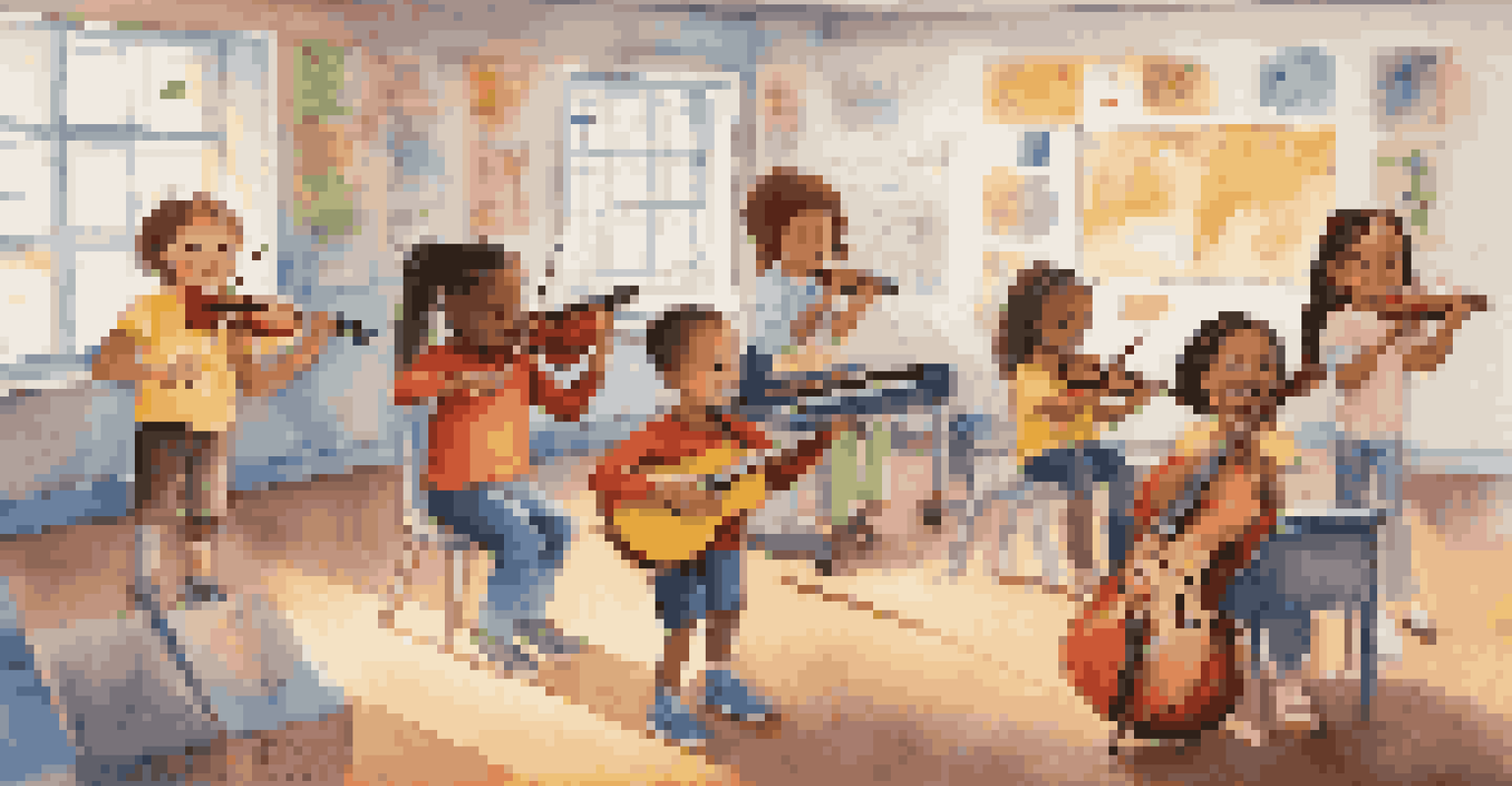The Effects of Music on Brain Connectivity and Communication

Understanding Brain Connectivity and Its Importance
Brain connectivity refers to the way different regions of the brain communicate with each other. It's crucial because effective communication between these regions underpins our cognitive functions, such as memory, attention, and emotional regulation. When connectivity is strong, our brains function more smoothly, much like a well-oiled machine.
Music can change the world because it can change people.
This connectivity can be influenced by various factors, including our environment, experiences, and even the music we listen to. Studies have shown that engaging with music—whether by playing an instrument or simply enjoying a favorite song—can enhance these pathways. Just think about how listening to a moving piece of music can evoke strong emotions; that’s your brain’s connectivity in action.
Understanding how music interacts with our brain connectivity can help us harness its power for various benefits, including improved mental health, better learning, and enhanced social interactions. In this article, we’ll delve deeper into how music impacts our brain’s intricate network.
The Science Behind Music and Brain Activity
When you listen to music, your brain is lit up like a Christmas tree! Various studies using imaging techniques have revealed that music activates multiple areas of the brain, including those involved in emotion, memory, and even motor control. This widespread activation is fascinating because it shows how music can engage us on many levels.

For example, a study found that musicians often have better connectivity between the left and right hemispheres of the brain, which is linked to improved cognitive abilities. This phenomenon is akin to a bridge that connects two islands, enhancing communication between them. As a result, musicians tend to excel in tasks requiring creativity and problem-solving.
Music Enhances Brain Connectivity
Engaging with music improves communication between different brain regions, boosting cognitive functions like memory and attention.
Moreover, different genres of music can trigger different responses in our brains. A calming piece might lower stress levels, while an upbeat song could boost our energy. This variability highlights the power of music as a tool for emotional regulation and cognitive enhancement.
Music's Role in Enhancing Communication Skills
Music not only impacts brain connectivity but also plays a significant role in enhancing our communication skills. Engaging with music can improve our ability to pick up on social cues, tone, and emotion, which are vital for effective communication. It’s like practicing a sport; the more you engage, the better you get.
Where words fail, music speaks.
For instance, singing in a group or participating in musical activities requires individuals to listen closely to each other and respond in real-time. This practice fosters a sense of connection and teamwork, enhancing interpersonal skills. Think of it as a rehearsal for life, where you learn to navigate the nuances of human interaction.
Research has shown that children who are exposed to music education tend to perform better in verbal and non-verbal communication tasks. This suggests that music can serve as a powerful vehicle for developing essential communication skills from an early age.
The Impact of Music on Emotional Connectivity
Music has a unique ability to evoke emotions and create a sense of connection among listeners. This emotional connectivity is vital for building relationships and fostering empathy. When we share a musical experience, it can feel like a shared heartbeat, bridging gaps between individuals.
For example, attending a concert or singing along to a favorite song with friends creates a communal experience that strengthens bonds. This shared emotional journey can lead to deeper understanding and compassion among people. It’s akin to sitting around a campfire, where stories and songs weave together to create a sense of belonging.
Music Boosts Communication Skills
Participation in musical activities fosters essential social skills and enhances our ability to understand and respond to emotional cues.
Moreover, certain types of music can help individuals process their emotions more effectively. For those dealing with trauma or grief, listening to specific genres can provide solace and understanding, making it easier to navigate complex feelings. In this way, music becomes a therapeutic tool that enhances emotional connectivity.
Music's Influence on Cognitive Development
Numerous studies suggest that music education can significantly enhance cognitive development, especially in children. Learning to play an instrument, for example, involves multiple brain functions, including memory, coordination, and spatial-temporal skills. This multi-faceted engagement is like a workout for the brain, building its strength and flexibility.
Research has shown that children who participate in music programs often outperform their peers in academic subjects like math and reading. This benefit stems from the way music enhances neural connections, creating a more robust brain network. It’s not just about hitting the right notes; it’s about exercising the brain in ways that translate to improved learning.
Additionally, music can also aid in memory recall. Techniques like using melodies or rhythms to remember information are effective study aids. Think of how easily you can recall a catchy jingle compared to a list of facts; that’s the power of music at work in cognitive development.
Therapeutic Uses of Music in Communication Disorders
Music therapy has gained recognition as a valuable treatment for individuals with communication disorders, such as autism or aphasia. Through structured musical activities, therapists can improve verbal and non-verbal communication skills, fostering better interaction with others. It’s like finding a secret language that helps break down barriers.
For instance, rhythmic patterns in music can aid in speech development for those with speech delays. The repetitive nature of music helps reinforce learning and memory, making it easier for individuals to express themselves. Imagine how a catchy song can stick in your head; that same principle applies to speech therapy through music.
Music Aids Emotional Healing
Listening to music can help individuals process emotions, creating connections that foster empathy and understanding among listeners.
Moreover, music can also enhance social skills by encouraging turn-taking, listening, and emotional expression. Group music-making activities provide a supportive environment where individuals can practice these skills without the pressure of traditional communication methods, making learning feel more like play.
Conclusion: Embracing the Power of Music
The effects of music on brain connectivity and communication are profound and multifaceted. From enhancing cognitive development to fostering emotional connections, music serves as a powerful tool in our lives. Embracing music—whether through listening, playing an instrument, or participating in group activities—can lead to numerous benefits for our mental and emotional well-being.
As we’ve explored, music can help us connect with ourselves and others on a deeper level. It transcends language and cultural barriers, providing a universal means of communication. Just as a beautiful melody can resonate with anyone, so too can the benefits of music touch every aspect of our lives.

So, let’s celebrate the power of music and integrate it into our daily routines. Whether it’s a soothing playlist during work or a lively sing-along with friends, music has the potential to enhance our brain connectivity and communication in ways we’re only beginning to understand.